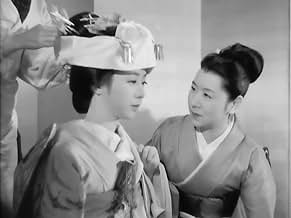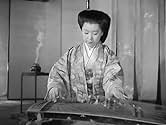IMDb-BEWERTUNG
7,4/10
2028
IHRE BEWERTUNG
Shinnosuke wird Shizu als zukünftige Frau vorgestellt, aber er verliebt sich in ihre verwitwete Schwester Oyu. Oyu überzeugt Shinnosuke und Shizu zu heiraten, damit sie in der Nähe von Shinn... Alles lesenShinnosuke wird Shizu als zukünftige Frau vorgestellt, aber er verliebt sich in ihre verwitwete Schwester Oyu. Oyu überzeugt Shinnosuke und Shizu zu heiraten, damit sie in der Nähe von Shinnosuke bleiben kann.Shinnosuke wird Shizu als zukünftige Frau vorgestellt, aber er verliebt sich in ihre verwitwete Schwester Oyu. Oyu überzeugt Shinnosuke und Shizu zu heiraten, damit sie in der Nähe von Shinnosuke bleiben kann.
- Regie
- Drehbuch
- Hauptbesetzung
Empfohlene Bewertungen
Mizoguchi was employed by a studio that wished, post war Japan, to target the womens market with superior, slightly racy melodramas. He directed what by todays standard seems an incredible number of movies in a few years, alternating personal projects like Lady Oharu with more commercial studio fare like this movie.
This is a top class example of the type of movie that resulted. The term 'womens movie' can seem a little derisive - but this was simply the market they aimed for. It is an adaption of a well known and respected book from the early '30's, although it is set in contemporary times, while the original was set in the Meiji period. In the excellent Masters of Cinema DVD, Tony Rayne's introduction suggests that Mizoguchi wasn't particularly proud of the movie, one reason being that he was forced by the studio to miscast Kinuyo Tanaka as the eponymous heroine, rather than a more elegant, disciplined actress (Hara Setsuko comes to mind as someone who would have played this beautifully). There is certainly a problem with the movie in that she plays the character as a more forceful, modern woman than was probably intended. But I think only those who read the book would find this a major problem.
The story concerns a young man who rather inconveniently falls in love with the beloved older sister (Miss Oyu) of his intended bride. His bride insists on going ahead with the marriage, but without consummating it, so that he can be close to Miss Oyu, who is a widow who must live at home with her in-laws to take care of her son, but by tradition is not allowed to remarry. Over the years the three-way relationship takes some predictably tragic turns.
The story is far more melodramatic than the movies of this period by Ozu or Naruse. It could have been pretty horrible in the hands of a less skillful director than Mizoguchi. But his astonishingly beautiful sets and his famous one cut scenes sets the movie apart. It really is gorgeous to look at.
These stories were and are seen by some Japanese as problematic, as they can be seen as romanticizing archaic sentiments. To my western eyes, I found it utterly fascinating. The manner in which people struggle under arranged marriages to find love and happiness is utterly alien to westerners, yet still compelling. I had somewhat low expectations about this movie as several sources dismiss it as very minor compared to Mizoguchi's pre-war and later period masterpieces. It is certainly not a work of genius to match Sansho Dayo or Ugetsu, but I found it riveting viewing and certainly not a minor movie by any standards.
This is a top class example of the type of movie that resulted. The term 'womens movie' can seem a little derisive - but this was simply the market they aimed for. It is an adaption of a well known and respected book from the early '30's, although it is set in contemporary times, while the original was set in the Meiji period. In the excellent Masters of Cinema DVD, Tony Rayne's introduction suggests that Mizoguchi wasn't particularly proud of the movie, one reason being that he was forced by the studio to miscast Kinuyo Tanaka as the eponymous heroine, rather than a more elegant, disciplined actress (Hara Setsuko comes to mind as someone who would have played this beautifully). There is certainly a problem with the movie in that she plays the character as a more forceful, modern woman than was probably intended. But I think only those who read the book would find this a major problem.
The story concerns a young man who rather inconveniently falls in love with the beloved older sister (Miss Oyu) of his intended bride. His bride insists on going ahead with the marriage, but without consummating it, so that he can be close to Miss Oyu, who is a widow who must live at home with her in-laws to take care of her son, but by tradition is not allowed to remarry. Over the years the three-way relationship takes some predictably tragic turns.
The story is far more melodramatic than the movies of this period by Ozu or Naruse. It could have been pretty horrible in the hands of a less skillful director than Mizoguchi. But his astonishingly beautiful sets and his famous one cut scenes sets the movie apart. It really is gorgeous to look at.
These stories were and are seen by some Japanese as problematic, as they can be seen as romanticizing archaic sentiments. To my western eyes, I found it utterly fascinating. The manner in which people struggle under arranged marriages to find love and happiness is utterly alien to westerners, yet still compelling. I had somewhat low expectations about this movie as several sources dismiss it as very minor compared to Mizoguchi's pre-war and later period masterpieces. It is certainly not a work of genius to match Sansho Dayo or Ugetsu, but I found it riveting viewing and certainly not a minor movie by any standards.
"Miss Oyu" is about a man in love with the elder sister of his wife. In fact he was already in love when he married, and he married only to become the brother in law of his loved one.
In Western style movies this love triangle would be all about trickery and deceit. In this Japanese film it is all about self sacrifice. The wife knows very well that her husband doesn't love her but wants to allow her sister a sexual relationship. A relationship that tradition denies to a widow with children.
The only Western film that vaguely resembles "Miss Oyu" in the treatment of a love triangle is part 9 of the "Dekalog" (1989, Krzysztof Kieslowski) in which an impotent man encourages his wife to take a lover. In this film self sacrifice ex ante does not preclude jealousy ex post. Also in "Miss Oyu" self sacrifice has its price.
"Miss Oyu" is based on a story by Junichiro Tanizaki and directed by Kenji Mizoguchi. Given these two big names one would expect a film of high quality. "Miss Oyu" is however at times very sentimental.
The reason probably is that "Miss Oyu" is the first film Mizoguchi made for the Daiei studio and the Daiei studio needed a commercial success very badly. By the term "studio system" everybody thinks of Hollywood, but the studio system in Japan worked more or less the same. When you were a renowned director, as Mizoguchi was, you were allowed to make one film for the sudio and one film according to your own artistic interest. "Miss Oyu" was for the studio.
In Western style movies this love triangle would be all about trickery and deceit. In this Japanese film it is all about self sacrifice. The wife knows very well that her husband doesn't love her but wants to allow her sister a sexual relationship. A relationship that tradition denies to a widow with children.
The only Western film that vaguely resembles "Miss Oyu" in the treatment of a love triangle is part 9 of the "Dekalog" (1989, Krzysztof Kieslowski) in which an impotent man encourages his wife to take a lover. In this film self sacrifice ex ante does not preclude jealousy ex post. Also in "Miss Oyu" self sacrifice has its price.
"Miss Oyu" is based on a story by Junichiro Tanizaki and directed by Kenji Mizoguchi. Given these two big names one would expect a film of high quality. "Miss Oyu" is however at times very sentimental.
The reason probably is that "Miss Oyu" is the first film Mizoguchi made for the Daiei studio and the Daiei studio needed a commercial success very badly. By the term "studio system" everybody thinks of Hollywood, but the studio system in Japan worked more or less the same. When you were a renowned director, as Mizoguchi was, you were allowed to make one film for the sudio and one film according to your own artistic interest. "Miss Oyu" was for the studio.
A man falls in love with the sister of his bride-to-be, but all parties involved are bound by societal constraints. The film has the usual stunning cinematography, with graceful tracking moves and elegant framing. The story is engaging, easy to follow and doesn't drag. It's an all-around good movie. But as I've said before, lately I'm getting bored with Mizoguchi. His films just don't thrill me like they used to. It gets kind of tiresome to watch people hang their heads and bemoan their situations all the time. I get that the point is they're being repressed by archaic social expectations, but it'd be nice to see a little more resistance. Everyone is so damn passive. Again, it's a well-crafted film but one that doesn't really inspire a lot of sympathy for the characters.
Shinnosuke accepts to marry Shizu in order to be closer to her sister, a widowed wife and mother of a son. Shizu proposes him marriage because doing so would mean staying near her sister, not marrying him and marrying another man would mean to separate from her. Japanese customs forbid Oyu (shizu's sister) to marry another man because it is her duty to educate his son for him to become one day the head of her deceased husband family. Oyu has the same feelings Shinnosuke has for her, so the marriage between him and her sister allows them to be together apparently with no suspicion. The three of them develop a strange bond.
There's really not much to say about the technical aspects in this film, if you know Mizoguchi's directing you know you're in good hands. Anyway though, as usual, the scenes are beautifully shot. I even found myself really liking the music here, it adds perfectly to the atmosphere.
Overall, this is another another great film from Mizoguchi that's worth the time.
There's really not much to say about the technical aspects in this film, if you know Mizoguchi's directing you know you're in good hands. Anyway though, as usual, the scenes are beautifully shot. I even found myself really liking the music here, it adds perfectly to the atmosphere.
Overall, this is another another great film from Mizoguchi that's worth the time.
Heart-wrenching and sad tale of love and sacrifice under harsh traditional rules is told in beautiful, lyrical black-and-white imagery and the cast perform excellently throughout, especially Kinuyo Tanaka in the title role.
Wusstest du schon
- VerbindungenReferenced in Aru eiga-kantoku no shôgai (1975)
Top-Auswahl
Melde dich zum Bewerten an und greife auf die Watchlist für personalisierte Empfehlungen zu.
Details
Box Office
- Weltweiter Bruttoertrag
- 5.020 $
- Laufzeit
- 1 Std. 34 Min.(94 min)
- Farbe
- Sound-Mix
- Seitenverhältnis
- 1.37 : 1
Zu dieser Seite beitragen
Bearbeitung vorschlagen oder fehlenden Inhalt hinzufügen













